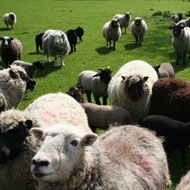
Pirbright Institute highlights 'lessons learned' from 2006
The UK is 'better prepared than ever' to prevent and control a potential outbreak of bluetongue virus (BTV), according to Dr Simon Carpenter, head of entomology at the Pirbright Institute.
Speaking at the 2016 World Buiatrics Congress in Dublin, Dr Carpenter said many lessons have been learned from the BTV outbreak in 2006 and there have been significant improvements in our ability to predict, detect and control the disease.
An assessment by Defra earlier this year indicated the UK is at greatest risk of an outbreak in late summer, as a result of infected midges being blown over from France to the south east of England.
In 2015-16, nearly 200 farms in France have been affected by the disease, which is caused by a virus transmitted by Culicoides biting midges. The French outbreaks present a possible threat to the UK as infected midges can be transported long distances over open water, such as the English Channel. BTV can affect all ruminants but sheep and cattle are most susceptible.
There are more than 27 serotypes of BTV and being infected with one does not protect the animal from being infected with another. Identifying the serotype involved in an outbreak is, therefore, important.
Pirbright is working to improve diagnostics. Home to the UK and European reference laboratory for BTV, it is has standardised testing that provides results much more quickly than traditional virus neutralisation tests - in around one day rather than three weeks.
Dr Carpenter said: "Our work at the Pirbright Institute has enabled us to develop predictive models to assess the probability of movement of infected midges from outbreak areas in France, and to demonstrate that our climate will not protect the UK from BTV transmission.
"As the re-emergence of BTV in France demonstrates however, it is still challenging to predict outbreaks of midge-borne viruses, which are still happening with high frequency in Europe."



 The Veterinary Medicines Directorate (VMD) is inviting applications from veterinary students to attend a one-week extramural studies (EMS) placement in July 2026.
The Veterinary Medicines Directorate (VMD) is inviting applications from veterinary students to attend a one-week extramural studies (EMS) placement in July 2026.